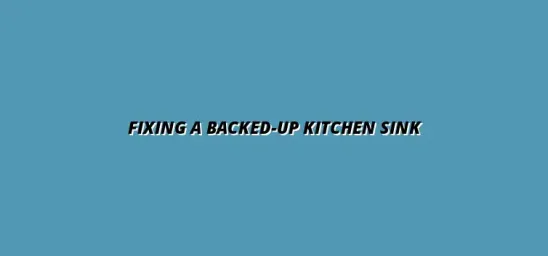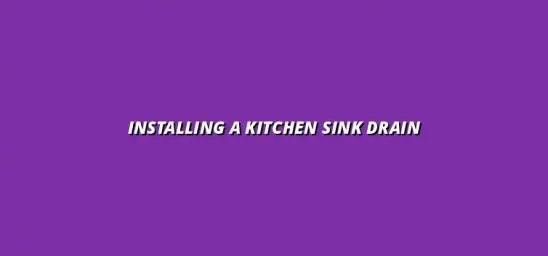
Preventing Grease Buildup in Pipes
Understanding Grease Build-Up in Kitchen Pipes
Grease build-up in kitchen pipes is a common issue many households face. It can lead to clogs, unpleasant odors, and even costly plumbing repairs. Understanding the nature of this build-up can help you take proactive steps to keep your pipes clear and maintain a healthy kitchen environment.
When grease, oil, and food particles wash down the sink, they can accumulate over time. This accumulation can harden, creating blockages that restrict water flow and cause other plumbing issues. It's important to address the causes and symptoms of grease build-up before it becomes a major problem. For example, learning how to prevent kitchen sink blockages easily is a crucial first step.
The Nature of Grease Buildup and Its Impact
Grease buildup occurs when fatty substances solidify and stick to the insides of pipes. Over time, this can lead to significant restrictions in flow, resulting in slow drains or complete blockages. The impact of grease build-up extends beyond just plumbing; it can also lead to foul odors and even attract pests!
By recognizing the signs of grease accumulation early, you can take measures to prevent severe clogs. Regular maintenance and cleaning are essential for keeping your kitchen plumbing in good shape. Here are a few key impacts of grease build-up:
- Slow draining sinks and fixtures
- Unpleasant odors from clogged pipes
- Increased risk of plumbing emergencies
What Causes Grease Accumulation in Kitchen Pipes?
Several factors contribute to grease accumulation in kitchen pipes. The most common is improper disposal of cooking oils and fats. People often rinse greasy pans and utensils without thinking, allowing grease to enter the plumbing system.
Other causes include:
- Food scraps that contain oils and fats
- Not using hot water to rinse greasy items
- Using the kitchen sink for food preparation waste
Being mindful of what goes down the drain is key to preventing grease build-up. Simple changes in your kitchen habits can have a significant impact on your plumbing health! Regular drain cleaning offers significant benefits, as explained in this helpful article on regular drain cleaning benefits.
Common Symptoms of Clogged Pipes Due to Grease
Identifying symptoms of clogged pipes early can save you from bigger headaches later on. Greasy clogs often lead to certain telltale signs. Here are some common symptoms to watch out for:
- Water draining slowly from sinks and drains
- Unpleasant smells emanating from the kitchen
- Gurgling sounds coming from pipes or drains
If you notice any of these symptoms, it’s important to take action quickly. Delaying action can lead to more severe plumbing issues and costly repairs down the road. Learning about natural ways to clean drains can be a helpful preventative measure.
Effective Strategies to Prevent Grease Buildup
Preventing grease build-up starts with good habits in the kitchen. By adopting effective strategies, you can keep your pipes clear and avoid the hassle of clogged drains. Here are some successful methods to consider:
- Regularly cleaning dishes and utensils
- Using hot water when rinsing greasy items
- Properly disposing of cooking oils and fats
Implementing these practices can help significantly reduce the amount of grease that enters your plumbing system. A little diligence goes a long way in maintaining a healthy kitchen!
Addressing Common Questions About Grease Build-Up
When it comes to grease build-up in kitchen pipes, many people have questions. It’s important to know how to deal with these issues before they escalate. Knowing the immediate steps to take can save you from bigger headaches down the road!
First, let’s explore what to do if you notice that grease is causing a blockage. It's crucial to act quickly to prevent further damage to your plumbing system. In many cases, simple interventions can help you manage the situation effectively.
What Immediate Steps Can Be Taken if Grease Build-Up Occurs?
If grease build-up is detected, here are some quick actions you can take:
- Stop using the sink immediately: This helps prevent more waste from accumulating.
- Boil water: Pouring hot water down the drain can help melt some of the grease.
- Use baking soda and vinegar: This combination can break down grease and remove odors.
- Plunge the drain: A plunger can help dislodge stubborn clogs.
These steps can help you manage minor blockages. However, if you notice serious symptoms, it may be time to call in a professional! If you're dealing with a serious clog, you might want to consider a professional plumber, such as a plumber in Billesley, Birmingham.
Signs of a Serious Clog and When to Call a Professional
It’s essential to recognize when a grease clog is beyond your ability to fix. Here are some warning signs that indicate you might need professional help:
- Slow drainage: If water is backing up or draining slower than usual.
- Unpleasant odors: Foul smells coming from the sink can indicate a severe clog.
- Visible leaks: Any signs of leaks under the sink could indicate deeper plumbing issues.
- Multiple clogged drains: If multiple sinks or drains are clogged simultaneously, this points to a more significant problem.
Calling a plumber at this stage can prevent further damage and save you money in the long run. Preventing water heater leaks is also very important, and this article on preventing water heater leaks easily can be helpful.
How to Safely Unclog Greasy Pipes at Home
If you decide to tackle the issue yourself, safety should always come first. Here are some tips to keep in mind:
- Wear gloves: Protect your hands from grease and harsh chemicals.
- Use a drain snake: These can effectively break up clogs without harsh chemicals.
- Avoid chemical drain cleaners: These can be harmful to your pipes and the environment.
- Follow up with hot water: After unclogging, pouring hot water can help clear remaining grease.
By following these steps, you can often resolve minor grease issues without needing a professional. Learning how to prevent hair clogs in drains can also help prevent future blockages, even if they aren't related to grease.
However, if the problem persists, don't hesitate to reach out for help! Knowing how to fix a clogged kitchen sink can also be beneficial.Long-Term Solutions for a Grease-Free Kitchen
Preventing grease build-up is not just about immediate fixes; it's about creating lasting habits in your kitchen. Educating everyone in the household about grease management can make a significant difference. The more everyone knows, the cleaner your pipes will stay!
Let’s dive into some practical ways to educate and involve your family in maintaining a grease-free kitchen.
Educating Household Members About Grease Management
Teaching your family, especially kids, about proper kitchen etiquette can go a long way in preventing grease issues. Here are some effective strategies:
- Explain the importance: Talk about why keeping pipes clean matters.
- Make cleaning a fun routine: Turn dishwashing into a game or challenge!
- Share responsibility: Assign specific tasks to each family member.
When kitchen cleaning becomes a family affair, everyone learns and contributes, leading to a cleaner environment!
Tips for Teaching Kids About Proper Kitchen Etiquette
Kids can be surprisingly teachable when it comes to kitchen responsibilities. Here are some tips to help them understand:
- Use visuals: Show them what happens to pipes with grease build-up.
- Involve them in cleaning: Let them help with tasks like rinsing dishes.
- Make it relevant: Relate it to their favorite activities, like cooking or baking.
When children feel involved, they are more likely to take the lessons to heart. Plus, it makes for some quality family time!
Encouraging Family Participation in Maintaining Clean Pipes
To keep everyone engaged in maintaining clean pipes, create a positive atmosphere around kitchen chores. Here are a few ideas to inspire participation:
- Set a schedule: Have regular days for kitchen cleaning duty.
- Offer rewards: Consider a small incentive for keeping the kitchen grease-free.
- Share success stories: Highlight times when everyone worked together to solve grease issues.
Building a sense of teamwork and responsibility in your household can lead to long-lasting positive habits!
Conclusion: Building Sustainable Habits for a Cleaner Kitchen
In conclusion, managing grease build-up in your kitchen is all about consistent and mindful practices. By adopting preventive measures and encouraging family participation, you’ll create a cleaner environment for everyone. Remember, a little effort can prevent significant issues down the line!
Recap of Preventive Measures for Grease Control
To recap, here are some critical preventive measures:
- Regularly clean dishes and utensils to keep grease from entering the pipes.
- Use hot water and natural cleaners to tackle any build-up.
- Educate family members about proper kitchen habits.
These small steps make a big difference in maintaining a grease-free kitchen!
Encouragement to Adopt Regular Maintenance Routines
Finally, I encourage you to develop a routine for checking and maintaining your kitchen plumbing. Whether it's a monthly inspection or a weekly cleaning, consistency is key! Together, we can create a cleaner, more efficient kitchen for everyone to enjoy.





Fixing a Backed-Up Kitchen Sink
Prepare Your Plumbing for Weather
Installing a Kitchen Sink Drain
When to Replace Plumbing Fixtures
Fixing a Jammed Garbage Disposal